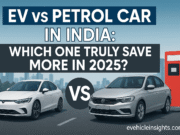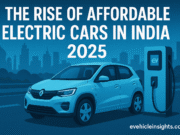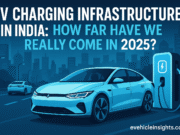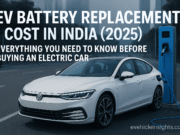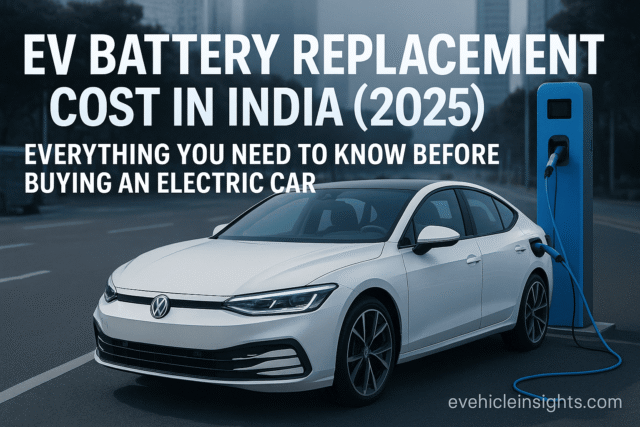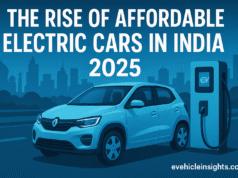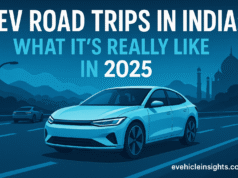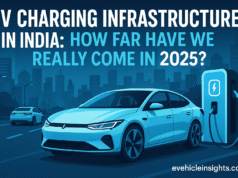TL;DR — Summary at a Glance
| Topic | Details |
| Battery Lifespan | Typically 8–10 years or 1.6 lakh+ km in India |
| Replacement Cost (2025) | ₹4.5 lakh – ₹7.5 lakh (for mass-market EVs) |
| Warranty Coverage | Most OEMs offer 8 years / 160,000 km warranty |
| Replacement Frequency | Once in 8–10 years (if well-maintained) |
| Alternatives | Battery leasing, swapping, extended warranties |
Introduction: The Silent Worry Behind EV Adoption in India
Let’s be honest. When most Indians talk about switching to electric vehicles, there’s always that one elephant in the room:
“What happens when the battery dies?”
The battery is the heart of an EV—and replacing it doesn’t come cheap. But how expensive is it really? Is it as bad as the WhatsApp forwards suggest? Or are we just fearful of a tech we don’t fully understand yet?
In this post, I’ll break down the real cost of EV battery replacement in India in 2025, separate fact from fear, and give you smart strategies to avoid major expenses.
What Makes an EV Battery So Expensive?
Before we talk numbers, it’s worth understanding what you’re paying for.
An EV battery (usually lithium-ion) is made of costly components—lithium, cobalt, nickel, and advanced battery management systems (BMS). It’s not just a big version of your smartphone battery.
Think of it as the engine of your EV. And just like engine overhauls cost lakhs in an ICE vehicle, EV batteries also carry a heavy price tag.
Battery Replacement Cost in India – 2025 Snapshot
Here’s what EV owners in India can expect in terms of battery replacement cost this year:
Mid-Range EVs (Tata, Mahindra, MG, BYD)
| Model | Approx Battery Cost (2025) |
| Tata Nexon.ev (Long Range) | ₹5.5 – ₹6.5 lakh |
| Mahindra XUV400 EL | ₹5.8 – ₹6.8 lakh |
| MG ZS EV | ₹6.5 – ₹7.2 lakh |
| BYD e6 | ₹7 – ₹7.5 lakh |
Note: This includes labor, taxes, and GST. Some OEMs offer discounts on out-of-warranty replacements.
Entry-Level EVs (Tiago.ev, MG Comet)
| Model | Battery Cost Estimate |
| Tata Tiago.ev | ₹3.8 – ₹4.5 lakh |
| MG Comet EV | ₹3.5 – ₹4 lakh |
Visual Insight: EV Battery Cost vs ICE Engine Replacement
| Component | EV Battery (e.g., Nexon.ev) | Petrol Engine (e.g., Nexon Petrol) |
| Lifespan | 8–10 years | 10–12 years |
| Replacement Cost | ₹5.5 – ₹6.5 lakh | ₹2.5 – ₹3.5 lakh |
| Covered Under Warranty? | ✅ (8 years / 160k km) | ❌ (usually 2–3 years) |
| Service Intervals | Minimal | Regular (oil, filters, etc.) |
| Downtime | 1–2 days | 4–5 days |
While EV battery replacements seem costlier upfront, over 8–10 years, EVs often make up for it via lower running and servicing costs.
What Factors Affect Battery Lifespan?
Just like smartphones, EV batteries degrade over time. But modern EVs have smart systems to minimize wear, and your driving habits matter.
6 Things That Kill Your EV Battery Faster
- Frequent DC Fast Charging
- Keeping battery at 100% too often
- High-speed, aggressive driving
- Letting charge drop below 10% regularly
- Extreme heat (especially in cities like Delhi or Chennai)
- Using AC and heating aggressively while parked
Tips to Maximize Battery Life
- Maintain charge between 20% and 80% for daily use
- Use AC charging (slow charging) when possible
- Avoid unnecessary fast charging unless on road trips
- Park in shaded/ventilated areas to reduce thermal stress
- Stick to the OEM-recommended servicing/checkup schedule
Warranty Coverage: Are You Protected?
Almost every OEM in India now offers 8 years or 160,000 km battery warranty.
| OEM | Battery Warranty (2025) |
| Tata | 8 yrs / 160,000 km |
| MG | 8 yrs / 150,000 km |
| Mahindra | 8 yrs / 150,000 km |
| BYD | 8 yrs / 160,000 km |
| Hyundai | 8 yrs / 160,000 km |
| Kia | 8 yrs / 160,000 km |
Important: Warranty covers capacity degradation below 70–75%, not just outright failure.
So, unless you drive like a maniac or neglect basic EV care, your battery is safe for nearly a decade.
Real Talk: What Happens When It Is Time to Replace?
Let’s say your EV is 9 years old, out of warranty, and battery degradation is hitting range anxiety levels.
Here are your options:
- OEM Replacement – Pricey but safest (OEM certified, new warranty)
- Refurbished Packs – Cheaper (~30–40% less) but with risks
- Battery Leasing (emerging) – Monthly payment to replace battery later
- Battery Swapping (limited to fleet use currently) – May expand to private EVs by 2026–27
In 2025, most personal EV users haven’t yet hit replacement age, but the market for third-party solutions is growing quietly in the background.
Expert Take: Should You Worry About EV Battery Replacement in 2025?
Honestly? No. Not for the next 6–8 years.
Here’s why:
- Battery tech is improving every year
- Prices have dropped 15–20% since 2020
- Warranties are longer and stronger
- Used EV market is evolving — your old EV may still fetch good resale even with some battery wear
- Circular economy for EV batteries (recycling, repurposing) is already gaining ground in India
So instead of worrying, focus on smart EV ownership—charge wisely, service regularly, and trust the tech to do its job.
Final Verdict: The Cost is Real, But the Fear is Overhyped
Yes, EV battery replacement is expensive in India. But it’s also:
- Covered by long warranties
- Avoidable for almost a decade
- Getting cheaper every year
- Manageable with smart care habits
If you’re buying an EV in 2025, battery cost shouldn’t be your deal-breaker—it should be a well-understood long-term consideration, just like engine repairs are for ICE cars.
Your Turn: Would You Still Buy an EV in 2025 Knowing This?
Have a battery-related question? Share it in the comments or tweet us @EVehicleIn — we’ll feature it in our next myth-busting post!


